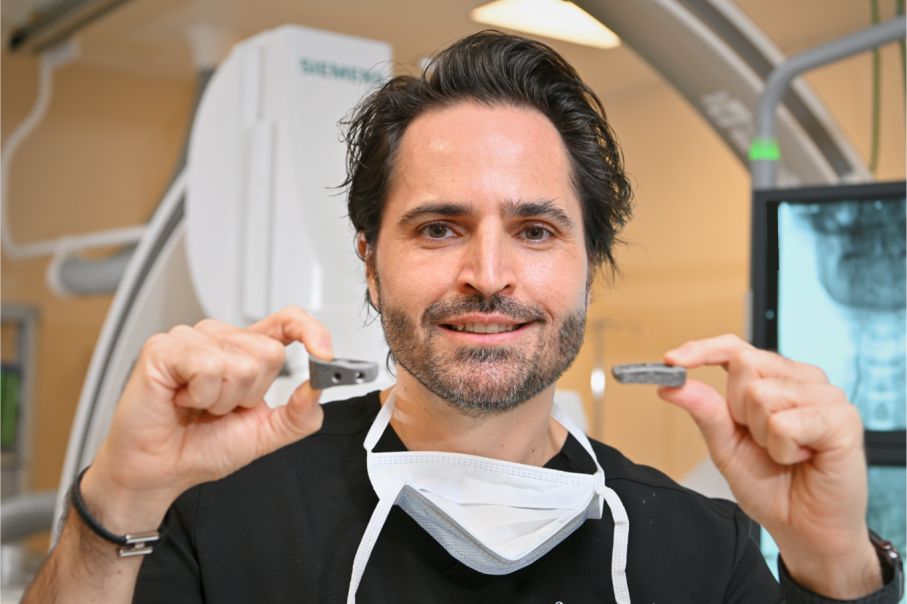PATERSON, N.J. (October 11, 2022) — St. Joseph’s Health is the first in New Jersey to perform a spinal procedure using a 3D printed patient- specific spinal implant. Geoffrey Appelboom, MD, PhD, FACS, Chief of Neurological Surgery, St. Joseph’s Health, and instructor of spine surgery at New York University (NYU) Grossman School of Medicine, performed the revolutionary surgery on a patient who was having difficulty walking and was suffering from chronic pain. As the first surgeon in the state to complete this procedure, Appelboom utilized a personalized implant to replace a diseased disc. The patient had already undergone several unsuccessful surgeries to treat the chronic and debilitating pain.
“This new technology will change the way we treat many failed spinal surgeries because it allows us to plan ahead and determine how the implant will fit before performing surgery,” said Dr. Appelboom, a leading brain and spine neurosurgeon at St. Joseph’s University Medical Center. “This is incredibly important because every patient’s spine is unique. Using an implant that is customized for each patient provides unparalleled precision by ensuring proper alignment with the patient’s anatomy.”
3D Printers have been used for decades to better visualize and design treatment plans for patients because it not only expedites treatment, but also decreases surgical errors and reduces the need for additional surgeries. As 3D printing has become more advanced and more available, its uses have continued to expand to more procedures, including custom fit medical devices, such as prosthetics and joint implants.
For this specific case, the aprevo® Spinal Implant, manufactured by Carlsmed® was used to correct the patient’s chronic pain and difficulty walking. Prior to surgery, Dr. Appelboom received a 3D model to ensure the implant would conform to the patient’s anatomy and would achieve the planned correction of her spinal misalignment. This also eliminates the need to try multiple implants during surgery, making it safer and faster. Every aspect of the implant’s dimensions were dictated by the physician, based on the specific needs of the patient,
“Traditionally, patients undergoing spinal surgery are at risk for postoperative complications and revision surgery,” said Mike Cordonnier, CEO of Carlsmed “Our goal is for aprevo® to be the last spinal surgery a patient will ever need.”
However, due to the complex nature of the spine and the complications that may arise during surgery, many Neurosurgeons and Spinal Surgeons have had limited exposure to this type of 3D printing for spinal misalignment. As the first surgeon in the state, and one of the first in the country to take on such a complex case, Dr. Appelboom, who specializes in correcting failed spinal surgeries, understood the challenges associated with this procedure, but felt confident that it could give the patient her life back.
Although the concept of using body scanner assisted manufacturing of devices to replace organs and bones is relatively new, there is a significant amount of research and clinical trials that are underway.
“Personalized implants are a game-changer for patients with spinal misalignment and other spinal cord disorders,” said Mark W. Connolly, MD, FACS, FACC, Chairman, Department of Surgery, St. Joseph’s Health. “As the first hospital in the state to utilize an implant that is manufactured to precisely match the specific needs of each individual patient, instead of a one-size-fits- all approach, this advanced treatment represents the advanced care our highly skilled surgeons provide at St. Joseph’s Health.”



